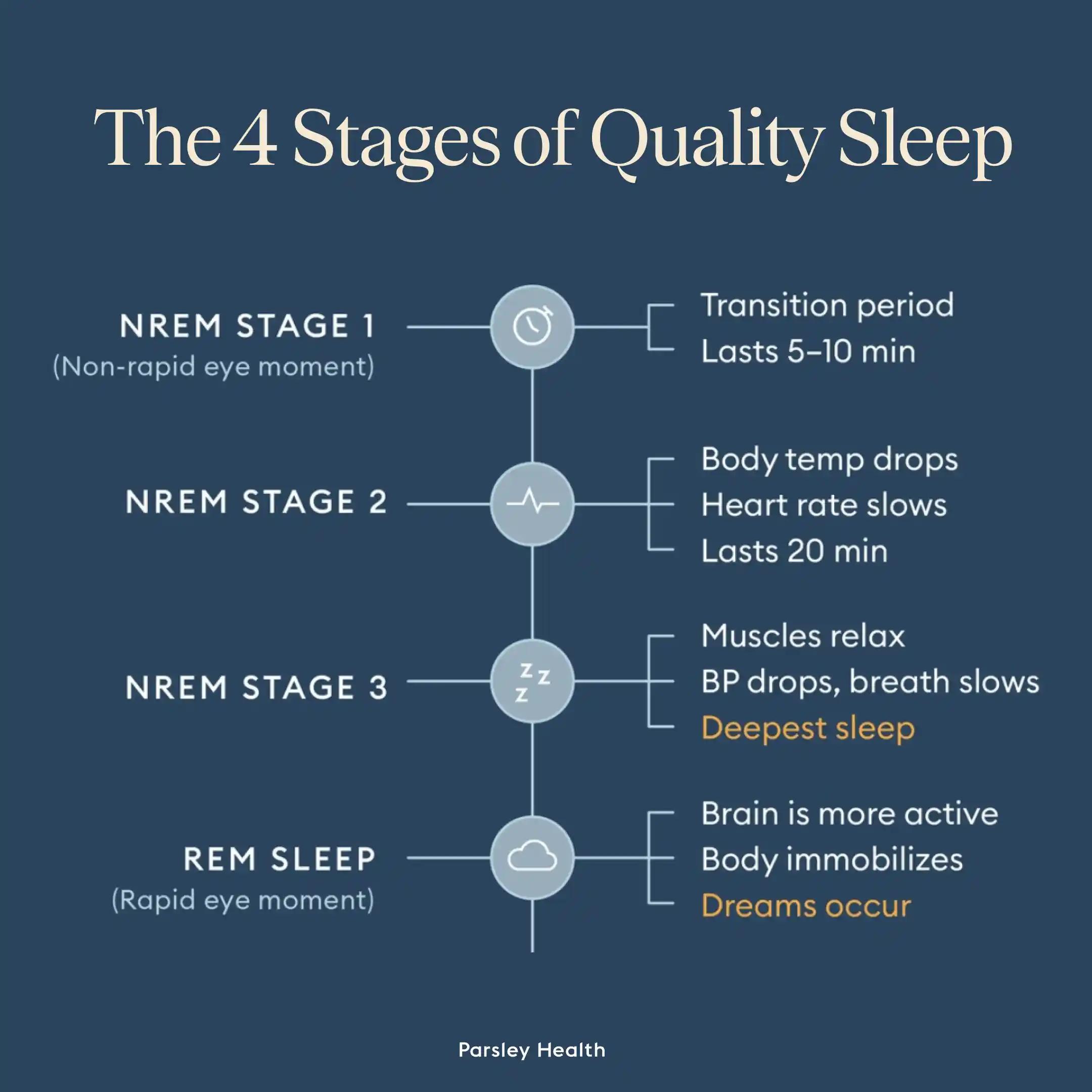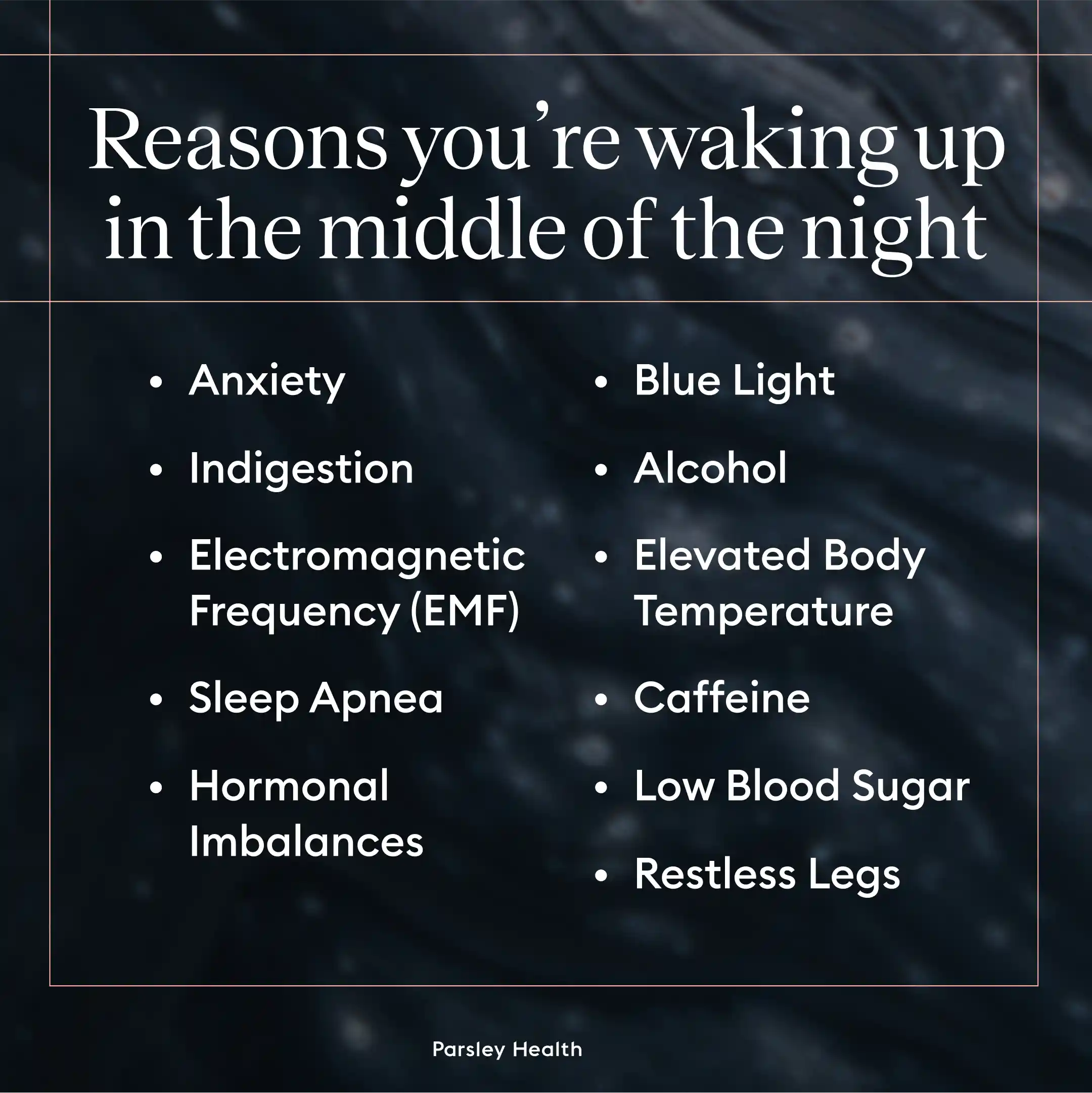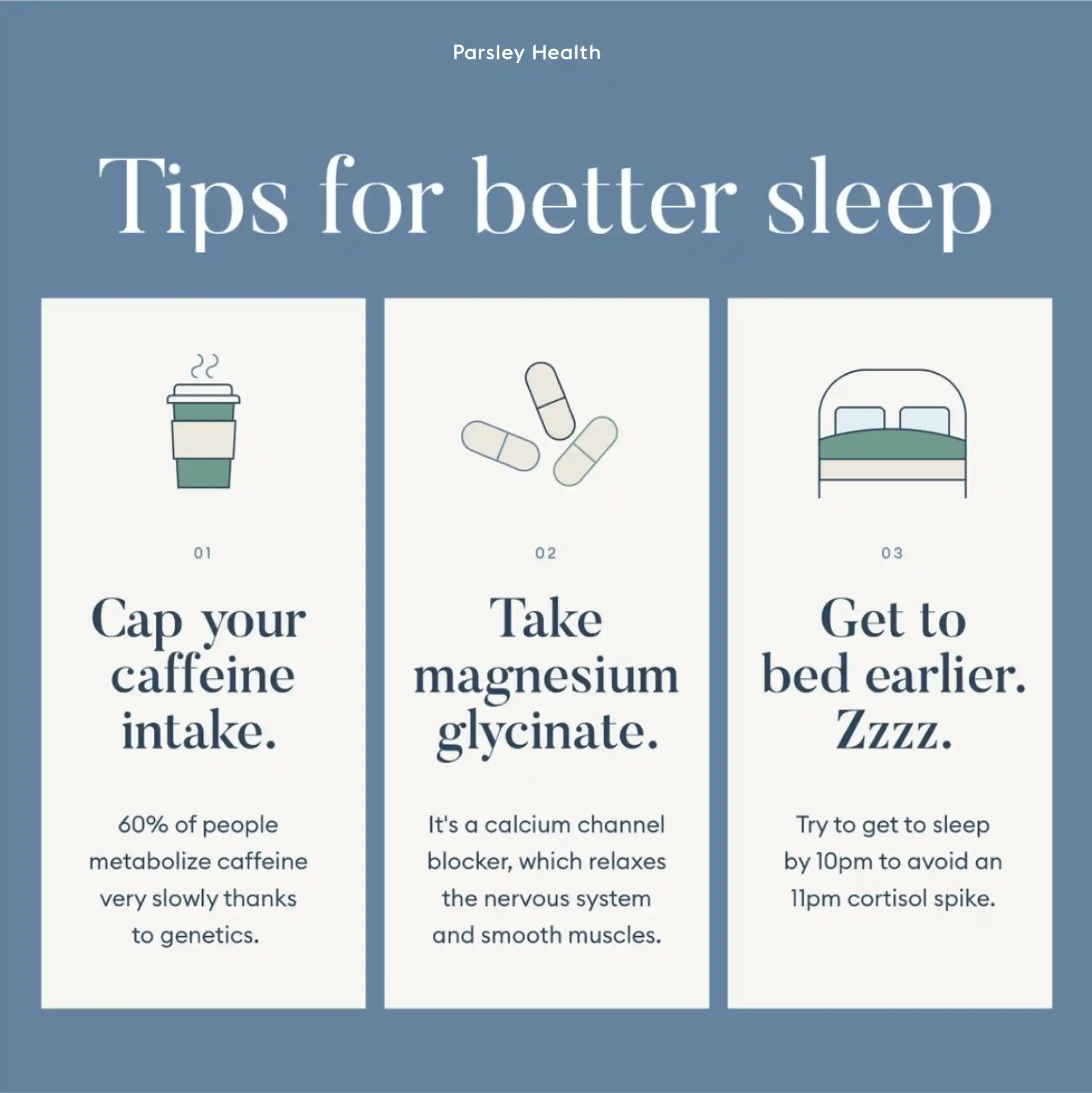Why do I keep waking up in the middle of the night?” It’s one of the most common sleep-related questions Parsley Health clinicians hear, and for good reason. Waking up at night can be frustrating, disruptive, and hard to ignore, especially when it happens over and over again.
If you’re struggling to get consistent, restful sleep, you’re far from alone. According to the CDC, more than one-third of adults don’t get enough sleep on a regular basis. While occasional night wakings are normal, frequently waking up in the middle of the night can leave you feeling exhausted, unfocused, and out of sync during the day.
When trouble staying asleep becomes a pattern, it’s worth paying attention. Chronic sleep disruptions have been linked to changes in mood, metabolism, immune function, and long-term health. Understanding why you keep waking up at night is an important first step toward improving sleep quality and identifying when additional support may be helpful.
Why quality sleep matters
Brain fog is a common complaint among sleep-deprived patients, Michael Zielinski, DO, says.
Other problems associated with inadequate or poor-quality sleep include increased pain and irritability, as well as elevated blood pressure and higher cortisol levels, which can lead to inflammation.
According to Dr. Zielinski, inflammation can predispose you to conditions including heart disease and dementia. Other health issues associated with inflammation include the following.
Good sleep doesn’t just refresh you. It also sets you up for optimal health. An ideal night’s sleep, says Zielinski, is one in which you sleep soundly for about seven to eight hours.
But he emphasizes that the “magic number” of hours varies. For example, one patient Zielinski recently saw routinely gets six hours of sleep and wakes up feeling energized. For this individual, more sleep wouldn’t be helpful.
Conversely, some people need more than eight hours of shut-eye per night. Determining your optimum amount of sleep is as simple as asking yourself how you feel when you wake up, he explains.
While getting the requisite quantity of sleep is important, quality also matters. Waking up in the middle of the night limits the time you spend in various sleep phases. These include rapid eye movement (REM) and your deepest sleep phase, called NREM 3. Both are crucial for your health.
 To get quality sleep, you must first address the root cause of the problem. Below are some of the most common causes of waking in the middle of the night.
To get quality sleep, you must first address the root cause of the problem. Below are some of the most common causes of waking in the middle of the night.
15 reasons you keep waking up in the middle of the night
 Anxiety
Anxiety
Anxiety is one of the most pervasive reasons people have trouble sleeping. Zielinski often recommends keeping a journal and a pen by your bed so you can jot down your thoughts when your mind is racing in the middle of the night. You can also try journaling right before bed to get out any anxious thoughts.
Blue light
Zielinski emphasizes the importance of avoiding screens about 30 minutes to an hour before bed. The blue light screens emit can interfere with your body’s melatonin release. This can impact your circadian rhythm, or your sleep-wake cycle.
Plus, the mental stimulation you experience when checking email and your social media feeds can make relaxing more difficult.
Caffeine
Some people have a gene called CYP1A2, which makes them more sensitive to caffeine. If you fall into this category, Dr. Zielinski recommends avoiding caffeine after noon.
Caffeine can rev you up and lead to restless sleep. As a diuretic, it can also increase the chance you’ll have to use the bathroom.
Sleep apnea
Sleep apnea is a serious sleep disorder characterized by momentary pauses in breathing. If you suspect you have sleep apnea, be sure to talk to your doctor who can order a sleep study if needed. Left untreated, sleep apnea can increase your risk of cardiovascular events and even death.
Indigestion
Digestive issues, especially acid reflux, are common causes of waking up at night. Quick fixes include avoiding snacks after dinner and eating your last bite at least three hours before you go to bed.
Zielinski also emphasizes the importance of addressing the underlying factors contributing to your digestive issues. Small intestinal bacterial overgrowth (SIBO) can cause of indigestion, for example.
Hormonal imbalances
Hormonal imbalances, such as those that occur with hyperthyroidism and perimenopause, can also lead to sleep disturbances. Zielinski recommends maintaining a cool sleeping environment, which can be helpful if you experience night sweats.
Night urination
If you frequently wake up to pee and struggle to fall back asleep, Zielinski suggests restricting your fluids at least two to three hours before bed.
Alcohol
Alcohol is a common sleep disruptor. “People will fall asleep quickly," Zielinski notes, "but then a couple of hours later, they actually will wake up because the alcohol has worn off, and then they have a really hard time going back to sleep.”
This is because the process of metabolizing alcohol can be stimulating to the body. Consider substituting your alcoholic beverage of choice with a non-alcoholic seltzer.
Travel
A new sleeping environment, such as a hotel, and a different schedule or time zone can wreak havoc on your sleep.
To mitigate the effects of travel, do your best to practice good sleep hygiene.
- Stay off of your electronic devices before bed.
- Stick to your usual sleep schedule as closely as possible.
- Make sure your room is as cool, dark, and quiet as possible.
Elevated body temperature
As part of preparation for sleep, your body temperature will naturally decrease.
But if your room is overly warm or you pile on too many layers, you may impede this process or you may become too overheated during the night to remain asleep.
Zielinski suggests trying a cooling mattress pad or adjusting your thermostat so it dips at night.
Pain
Pain, says Zielinski, is a frequently overlooked reason behind waking up in the middle of the night. This is particularly true for older adults with joint or back pain or anyone with a chronic pain condition.
Turmeric, which contains curcumin, may help because it is anti-inflammatory, Zielinski explains. Fish oil is another supplement that may alleviate pain. Talk to your doctor before adding new supplements to your diet, however.
Zielinski says his team frequently recommends yoga and stretching as well.
Low blood sugar
Low blood sugar, or hypoglycemia, is another factor in night waking, Zielinski says.
In response to a high-carbohydrate meal, the body can overcorrect with insulin to lower blood sugar. This can result in what's called postprandial reactive hypoglycemia, where your blood sugar drops below your baseline.
If you have prediabetes or diabetes, talk to your doctor about appropriate solutions to prevent hypoglycemia.
In the absence of these conditions, you can lessen the chances of low blood sugar by eating a meal that keeps your glucose level more stable.
Aim for pairing carbohydrates with healthy fats, protein, and fiber, which can help blunt a blood sugar spike that may then be followed by a crash.
Restless legs syndrome
Restless legs syndrome (RLS) is a neurological disorder in which people have an irresistible urge to move their legs. This can significantly disrupt sleep.
Iron deficiency may play a role. If you are experiencing RLS, talk to your doctor about treatments.
Leg cramps
If muscle cramping in your legs interrupts your sleep, Dr. Zielinski says this might be a sign of an electrolyte, calcium, or magnesium imbalance.
Often, taking certain types of magnesium before bed works very well, but lab work can help identify imbalances that your doctor can address.
Noise
Noise pollution from nearby traffic, trains, factories, and more is a common sleep disruptor. A sound machine or app that plays white noise and ear plugs are easy solutions.
Resolving restless sleep patterns naturally
 If you are struggling with waking up in the middle of the night, the first step is understanding what’s causing it.
If you are struggling with waking up in the middle of the night, the first step is understanding what’s causing it.
Parsley Health’s doctors and providers work with members to get to the bottom of why they’re not sleeping well. Then they help to find solutions.
According to Dr. Zielinski, you will need to answer a series of detailed questions about your sleep and health so your provider can understand your sleep habits and the issues you’re experiencing.
They’ll also ask about any supplements or medications you may be taking and may recommend specialized testing.
Your treatment will be highly individualized, depending on the cause of your night awakenings.
When to seek help about waking up in the middle of the night
If you're experiencing ongoing unexplained sleep disturbances, talking to a doctor is a good idea.
We all experience a night of disrupted sleep once in a while. However, chronic sleep issues could be a sign of an underlying sleep disorder. A lack of quality sleep can also lead to serious health issues.
Frequently asked questions about waking up in the middle of the night
What causes you to wake up in the middle of the night for no reason?
You may regularly wake up in the middle of the night if you have a sleep disorder or if you have a lifestyle habit, such as consuming alcohol, that is impacting your sleep quality.
How can I stop waking up in the middle of the night?
To stop waking up in the middle of the night, you'll first need to determine the underlying cause. If sleep disturbances continue to be an issue for you, consult your doctor.
Why do I wake up at exactly 3 a.m. every night?
Not everyone sleeps soundly through the entire night. During sleep, we undergo several sleep cycles, each with several phases. You may be waking between one cycle and the next.
If you're able to go right back to sleep, waking briefly isn't an issue. However, if you are having trouble staying asleep night after night, consult your doctor.
Is it normal to wake up multiple times at night?
Waking occasionally during the night can occur for several reasons. However, if you are experiencing frequent arousals from sleep and not feeling rested the next day, talk to your doctor for an evaluation.
 To get quality sleep, you must first address the root cause of the problem. Below are some of the most common causes of waking in the middle of the night.
To get quality sleep, you must first address the root cause of the problem. Below are some of the most common causes of waking in the middle of the night.


 Anxiety
Anxiety If you are struggling with waking up in the middle of the night, the first step is understanding what’s causing it.
If you are struggling with waking up in the middle of the night, the first step is understanding what’s causing it.



